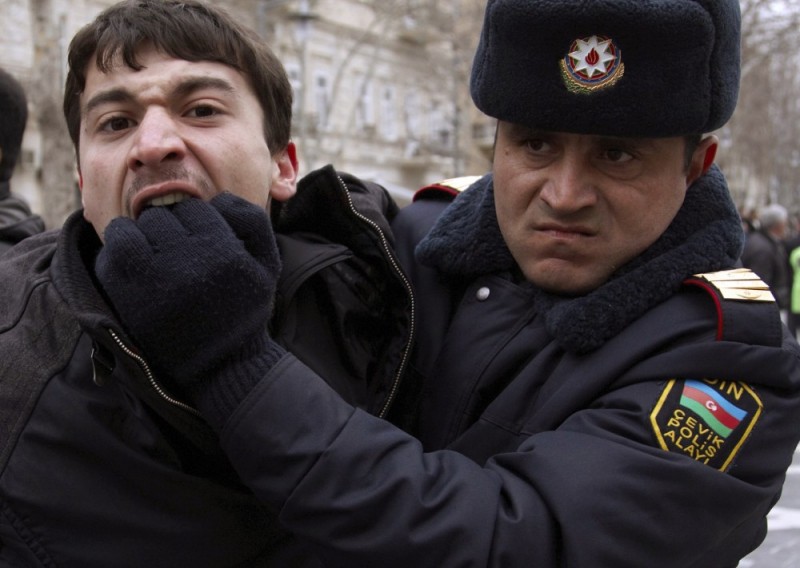Baku: Peaceful protest crushed on eve of Eurovision
As the world turns its attention to Azerbaijan for the Eurovision Song Contest, police crack down on dissent.
(more…)
As the world turns its attention to Azerbaijan for the Eurovision Song Contest, police crack down on dissent.
(more…)
 As the Eurovision Song Contest hits our screens next week, Index calls on the expected 125 million viewers not to ignore the human rights abuses – against journalists, artists, activists – that the Azerbaijan government presides over
As the Eurovision Song Contest hits our screens next week, Index calls on the expected 125 million viewers not to ignore the human rights abuses – against journalists, artists, activists – that the Azerbaijan government presides over
Index on Censorship writer and youth activist Turgut Gambar was among activists arrested yesterday (14 May) during a demonstration in Baku, Azerbaian. Police violently dispersed peaceful protests ahead of the Eurovision Song Contest which will take place later this month. Specifically targeting opposition party members, police beat demonstrators at rallies in Sabir Garden in front of the city authorities’ offices. Around 300 protesters gathered to call for the release of Azerbaijan’s political prisoners.
This is a crosspost from the Media Legal Defence Initiative
On the eve of the Eurovision song contest, Azeri journalists have complained to the European Court of Human Rights about the president’s stranglehold over the country’s broadcasting system.
Every year millions of people around the world watch the Eurovision Song Context, one of the biggest annual international media events. But many may not know that this year it is being hosted by a country which tightly controls its own media and offers its own viewers little choice in what they can watch – Azerbaijan.
In this former Soviet republic most TV and radio outlets are controlled by President Aliyev or members of his family, while nominally independent broadcasters are owned by people close to him. Moreover, the president appoints all nine members of the broadcasting regulatory body, the National Television and Radio Council, whose responsibilities include granting broadcast licences.
One consequence is that, though freedom of speech is officially guaranteed by the constitution, there is little public debate on political, economic and other vital issues. Violence against journalists and bloggers in the country is endemic and independent journalists work in a climate of constant legal threat.
But now two prominent Azerbaijani journalists have gone to the European Court of Human Rights to challenge this effective monopoly of control. The journalists — Yashar Agazade and Rasul Jafarov — have lodged a complaint about the repeated refusal of the regulatory council to grant a licence for the independent radio station they wish to set up.
They argue that this refusal not only denies their right to freedom of expression under Article 10 of the European Convention on Human Rights but means Azerbaijan is failing to ensure a pluralistic media landscape as the Convention requires it to.
Their application comes on the back of some fifty other complaints from Azeri journalists already pending at the Strasbourg court.
The matter has particular urgency because elections are due in 2013, and a favourable decision would force the government to make media reforms that would allow for more open debate before then. So whatever the outcome of the coming Eurovision contest, the journalists are hoping their case — which is being supported by MLDI — will result in a “nul point” verdict from the European Court judges.
Mark Stephens of Finers Stephens Innocent, part of the legal team for the applicants, said:
“Azerbaijan has de facto outlawed criticism of its leadership. If an Azeri journalist engages in the sort of tongue-in-cheek commentary that is provided for Eurovision by Graham Norton, chances are it will result in their imprisonment. So it is essential for this case to be successful if tongue-in-cheek comments are to be made either by Graham Norton, or indeed Azeri journalists on local political matters — or, indeed, Eurovision.”